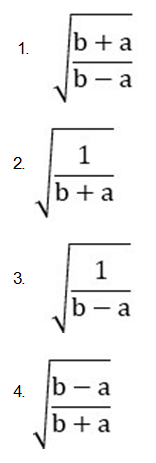Question
For how long can the Central Government supersede the
Board?Solution
Section 17 of SEBI Act Power of Central Government to supersede the Board.—(1) If at any time the Central Government is of opinion— (a) that on account of grave emergency, the Board is unable to discharge the functions and duties imposed on it by or under the provisions of this Act; or (b) that the Board has persistently made default in complying with any direction issued by the Central Government under this Act or in the discharge of the functions and duties imposed on it by or under the provisions of this Act and as a result of such default the financial position of the Board or the administration of the Board has deteriorated; or (c) that circumstances exist which render it necessary in the public interest so to do, the Central Government may, by notification, supersede the Board for such period, not exceeding six months, as may be specified in the notification.
A well with 20 m inside diameter is dug 10 m deep. Soil taken out of it has been evenly spread all around it to a width of 30 m to form an embankment. F...
A hemisphere of radius 14 cm is placed on a flat surface with its curved side touching the surface. A cylinder with the same radius and height of 14 cm ...
The length and breadth of a rectangle are increased by 20% and 30% respectively. The increase in the area of the resulting rectangle will be:
If the length of the diagonal of a square is 4.8 cm, then the area of the square is:
The perimeter of a rectangle is 104 cm. The side of the square is taken as the average of the rectangle’s length and breadth. Find the area of the squ...
The area of a square is 729 cm2 which is 48 cm2 less than that of a rectangle. Find the perimeter of the rectangle if the length o...
If b sin θ = a, then sec θ + tan θ = ?

The volume of a rectangular tank is 1680 m³, and the ratio of its length, width, and height is 7:6:5, respectively. What is the length of the rectangul...
The surface area of water in a swimming pool forms a rectangle with length 30m and breadth 12m. The depth of water increases uniformly from 1.4m to 2.6m...
If the curved surface area of a cylinder is 128 p cm² and its height is 16 cm. then, what is the volume of the cylinder?(in cm 3 )



